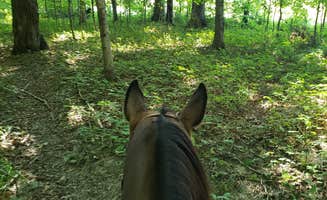Equestrian camping options near Eureka, Illinois center around the Hennepin Canal and Sand Ridge State Forest areas. Central Illinois terrain consists primarily of flat prairie with some forested regions containing sandy soil and rolling hills. Winter temperatures typically range from 14°F to 32°F, while summer brings 65°F to 88°F averages with moderate rainfall throughout spring and summer months.
What to do
Trail riding access: At Horseman's Park — Sand Ridge State Forest, riders can explore nearly 50 miles of equestrian trails directly from the campground. "A friend and I were looking for somewhere to spend a weekend backpacking that wasn't a 4+ hour drive away from central IL. This fits the bill... the terrain is an interesting change from most IL hiking since the trails are incredibly sandy while the forest itself is mostly pine. Watch out for cacti along the trail!" The sandy trails provide a unique riding experience unlike typical Illinois terrain.
Fishing opportunities: Comlara County Park offers extensive lake access with multiple fishing spots. "We got a beautiful spot right on the lake... Our site was huge. Right by jones pond, but the fishing was not the best right by our site." The park maintains several fishing access points, with early morning hours providing the best opportunity for catches.
Wilderness exploration: Jubilee College State Park Campground features prairie conservation areas with distinct vegetation zones. "The abundant forest, trails and the creek going through the park make this an ideal place to visit during spring and fall." Visitors report wildlife sightings including bobcats during evening hours, creating unique nature observation opportunities.
What campers like
Spacious sites: Campers at Deer Creek Campground appreciate the generous site dimensions. "Large, quiet campsites that are not too crowded. Near the back you can camp right alongside the river." Sites along water features tend to fill first during summer months.
Horse accommodations: Hennepin Canal Lock 21 Campground offers dedicated equestrian facilities not found at most public campgrounds. "Located literally just a few stone's throw due west of the tiny town of Wyanet... the sixth and final camping area that has been reserved for equestrian campers, of which there's about 4-5 individual sites complete with a wooden hitching post to tie your horses down." The canal provides a scenic backdrop for riders and non-riders alike.
Quiet atmosphere: Many camping areas provide peaceful settings away from urban noise. "This is a beautiful state park, lovely camping. I was on site P16 which offers a lake view... The price was great at $20 a night." Most horse campgrounds maintain distance between sites to accommodate trailers and provide adequate space for animals.
What you should know
Water access limitations: Not all campgrounds provide reliable water sources. "There is no potable drinking water anywhere at any of these locks up and down the Hennepin Canal apart from at the Visitors Center, so ensure you bring your own water or a filtration system." Even campgrounds with water spigots may have seasonal availability restrictions.
Bathroom facilities vary: Most equestrian campgrounds provide only basic facilities. "The campground has basic class C camping, meaning that these primitive camping sites do not have showers or electricity." At Moraine View State Recreational Area, campers note "bathrooms seemed dirty even for campground bathrooms & 1 stall was broken, leaving 3 showers & 2 flush toilets for the whole campground."
Horse requirements enforced: Some campgrounds strictly limit access to those with horses. "Got kicked out cause I didn't have a horse. Even though it was completely empty." Rangers actively check for compliance with equestrian-only camping restrictions, particularly during busy summer weekends.
Tips for camping with families
Playground access: Families should consider campgrounds with child-friendly amenities. "There are a few playgrounds for the kids to stay busy as well as small marked trails to follow." Some sites offer direct access to swimming areas for an additional fee.
Wildlife education opportunities: Family camping provides natural learning experiences. "Occasionally, if you are especially quiet, you'll come across no shortage of white-tailed deer or wild turkeys foraging through the crabapple and plum trees that are scattered throughout the forest here." Morning and evening hours typically offer the best wildlife viewing times.
Safety concerns: Parents should be aware of natural hazards. "In all of my camping, I have never really worried too much about poison ivy or ticks, until I came here – you definitely want to not only look out for the 3-leafed poison ivy that thrives here... but be sure to bring some suave to apply to any skin that comes into contact with this nefarious plant." Insect repellent and proper footwear recommended for all family members.
Tips from RVers
Site selection strategy: RVers should research site layouts carefully when selecting horse campgrounds. "The campsite has three main loops with RV pads and electric goo ups. We tent camp and majority for the sites also have plenty of room for one or two tents." Sites that accommodate both living quarters and horse trailers typically require advance planning.
Leveling challenges: Many equestrian sites present leveling difficulties. "There was not a level campsite available in the whole place- all had some gravel that had obviously not been maintained in several years." RVers recommend bringing additional leveling blocks, particularly for larger rigs.
Utility limitations: Most horse campgrounds provide minimal hookups. "Only electric hook ups" is common at public equestrian facilities. RVers should plan to arrive with full water tanks and empty waste tanks since dump stations are limited throughout the region.


